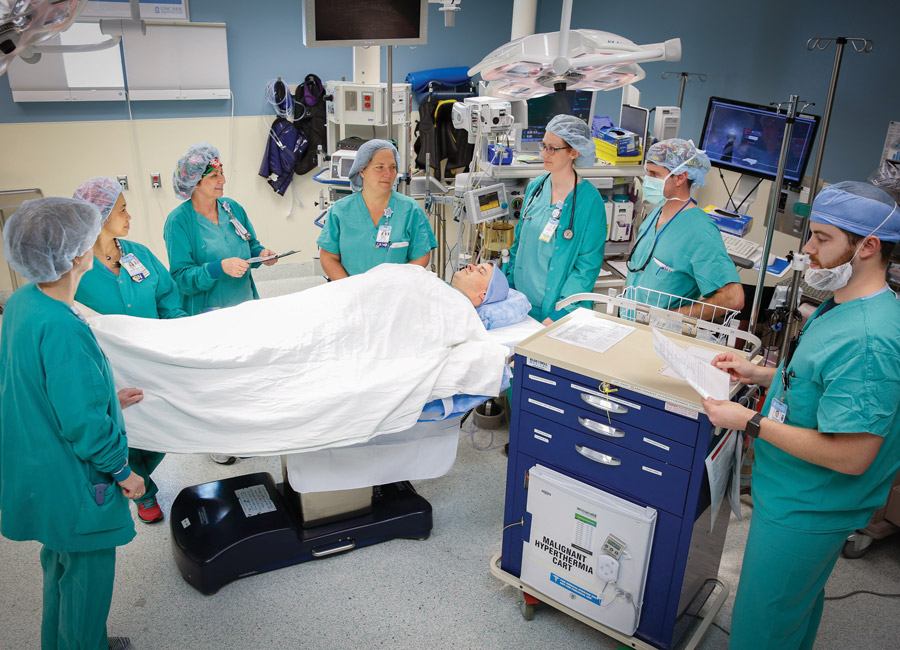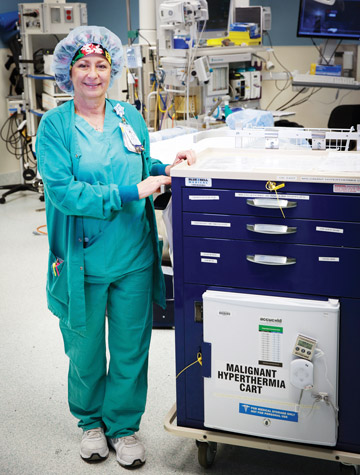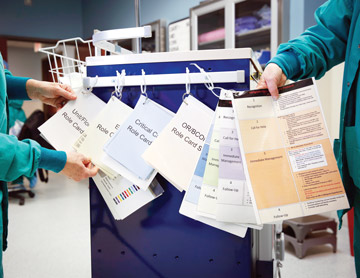Anesthesia providers at Children's Hospital Medical Center in Omaha, Neb., fill the top drawer of their MH carts with medications needed during an emergency response. "Dantrolene is right there, ready for us to start mixing and give right away," says Ryan Hamlin, MD, clinical director of pediatric anesthesiology and a consultant for the hotline of the Malignant Hyperthermia Association of the United States (MHAUS). He points out that there are 2 formulations of dantrolene on the market:
- Dantrium (Par Pharmaceutical) and Revonto (US WorldMeds) come in 20 mg vials that require 60 ml of sterile water to reconstitute. You must stock 36 vials of each formulation, which have shelf lives of 3 years, at a cost of $2,340 for Dantrium and $2,400 for Revonto. Your staff must reconstitute 8 vials of either medication to deliver the initial 2.5 mg/kg dose that's needed to stabilize a stricken patient.
- Ryanodex (Eagle Pharmaceuticals) comes in 250 mg vials that require 5 ml of sterile water to reconstitute. You must stock 3 vials of the drug, which has a shelf life of 33 months at a cost of $8,134. The initial 2.5 mg/kg dose can be administered with a single vial.
"Ryanodex can be reconstituted more quickly and with a smaller volume of sterile water," says Dr. Hamlin. "The active medication is exactly the same as the other drugs, which require quite a bit of elbow grease to ready for administration."
Colleen Bradley, BSN, RN, CNOR, a surgical services staff nurse at UNC REX Healthcare in Raleigh, N.C., agrees that Dantrium and Revento can be challenging and time-consuming to prepare, and that Ryanodex is easier to reconstitute. But you have to decide if it makes sense to pay more for a drug that takes less time to administer in an emergency situation that, in all likelihood, you won't face before it expires. There's no right answer. (MHAUS does not endorse one formulation over the other.)
In fact, UNC REX stocks both formulations. The care team treats patients with Ryanodex during the onset of an MH crisis and, once patients are stabilized and transferred to the ICU, they administer one of the other formulations as maintenance doses while patients are observed for recurrence.
There are other medications you should have available in MH carts, including:
- sodium bicarbonate 8.4% to correct acid-base disturbances;
- insulin to treat high potassium levels;
- dextrose 50% to co-administer with insulin to maintain normal blood sugar levels;
- calcium chloride 10% to protect the heart from severe hyperkalemia; and
- lidocaine and amiodarone to treat cardiac arrhythmia.
Also fill the MH cart with the sterile water needed to reconstitute dantrolene — MHAUS suggests storing the water in 100 vials instead of bags to prevent accidental IV administration — and supplies for administering the emergency response drugs, including needles, syringes and IV catheters.
.svg?sfvrsn=be606e78_3)



.svg?sfvrsn=56b2f850_5)